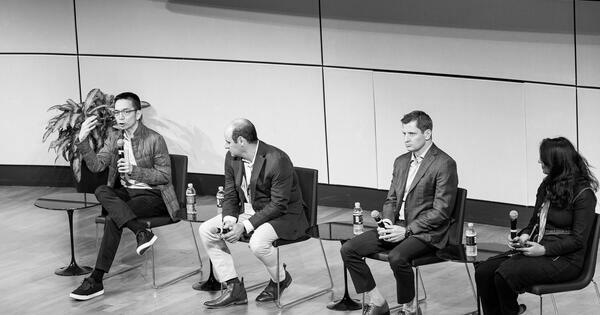
In just a few years, AI has transformed how many people draft emails and résumés, compose music, and even share their deepest feelings. It’s also reshaping the economic landscape. Investors are deploying vast amounts of capital to finance data centers and other AI infrastructure; global powers are racing to develop the most sophisticated and cost-effective models; and companies must decide how to utilize a technology with the potential to change contemporary life as much as the advent of the internet.
The second annual Responsible AI in Global Business Conference at Yale SOM convened students, executives, and policymakers to take stock of this dynamic landscape and articulate solutions for unlocking AI’s benefits without compromising data privacy, public trust, or job security.
The keynote panel featured four people who have been closely involved in applying AI technology to their organizations and in the wider society. They discussed the organizational changes they are making to increase productivity, their strategy for communicating with consumers and employees about new technology, and the AI use cases that will prove most important in the years ahead.
Saira Jesani, executive director of the Data & Trust Alliance, moderated the panel, which included Jim Swanson, executive vice president and CIO of Johnson & Johnson; John Maeda, vice president of engineering and head of computational design at Microsoft; and Rob Thomas, senior vice president for software and CCO at IBM.
Swanson, Maeda, and Thomas represent companies that have weathered decades—in the case of IBM and Johnson & Johnson, centuries—of technology transformations. All three drew on that institutional background in their remarks, emphasizing the importance of understanding AI as an outgrowth of existing technologies rather than a frightening and unprecedented phenomenon.
“I urge you to remember that this is a kind of computer science that we didn’t have access to in the past,” said Maeda. “Understand it before making judgment.”
Surveying the landscape
Consumer-facing demonstrations of AI’s capabilities—for example, composing a professional email or generating photorealistic images from a single prompt—have dominated public discourse about the technology since the release of ChatGPT. But panelists predicted that in the near future, companies will focus on less flashy but more valuable applications of AI on internal processes.
“This decade is going to be about value creation, rather than the technology itself,” Thomas said. He reported that IBM has been using its own AI services to deliver $3.5 billon in productivity gains since 2020; most of those gains come from automating repetitive tasks in areas like finance and supply chain management. As a result, Thomas said, the company has been able to “ramp down” its hiring of new employees.
Swanson said that Johnson & Johnson has succeeded in using AI to automate processes across the company, which includes pharmaceuticals and medical technologies. For example, Swanson said, AI can use supply chain data to predict when hospitals will require certain surgical supplies, or help scientists decide which medical molecules to investigate in pharmaceutical research. Now, the company is applying agentic AI—a branch of the technology that can autonomously solve complex problems—to its operations and research strategy. This kind of AI can be particularly helpful in sifting through large data sets to deliver actionable insights.
Leading organizations through change
A company’s successful AI transformation requires both a mastery of technology and a solid understanding of how people behave when confronted with change in the workplace. Swanson said one of his major responsibilities as Johnson & Johnson’s CIO is teaching the company’s 135,000 employees about the possibilities of technology. Communicating internally, he said, he stresses the importance of combining AI with “domain expertise” in areas like finance, procurement, and supply chain management that only human employees possess. The company also incentivizes AI adoption among its own ranks by encouraging upskilling and offering a digital bootcamp in which 30,000 employees are currently engaged.
“Having that education is really key,” Swanson said.
You have to continue to reinvent your companies to be relevant and add value for your customers. Otherwise, you don’t exist.
Thomas said that while he understands why AI is frightening to some, he believes that companies and societies have more to lose by not pursuing new technologies. He pointed out that GDP growth requires a combination of productivity, population, and debt growth. With population growth stagnating in most countries and many economies facing high volatility, productivity may be the most feasible area for growth in the immediate future.
“I don’t think we really have an alternative to improve the human condition and the world,” he said.
Maeda added that change—even the radical change that AI adoption can entail—is a necessary part of every successful organization’s trajectory. “If you don’t like change,” he said, quoting U.S. General Eric Shinseki, “you’re going to like irrelevance even less.”
Transforming jobs
Jesani noted that in her work with the Data & Trust Alliance, a consortium of major companies working to develop best practices for AI use, she’s observed senior executives are eager to adopt the technology while junior practitioners are likely to fear for their careers. Their response, she said, often boils down to the question, “What does upskilling look like for me?”
Both Swanson and Thomas said that AI works best when applied to repetitive tasks, and that ubiquitous coders, developers, and user experience designers will be in demand long into the future.
“I still need really smart software developers who can stitch together a labyrinth of systems and processes with good code,” Swanson said.
Safeguarding public trust
In a moment when 52% of Americans are more concerned than excited about the possibilities of AI, assuring consumers that companies are adopting new technology responsibly is paramount.
Swanson said that Johnson & Johnson has added information to its website about how the company uses AI and reconciles the technology with respect for data and privacy. Thomas added that there’s a distinction between applying AI to open source or internal proprietary data, which can create valuable productivity gains, and applying it to consumer data, which can lead to privacy issues.
“I don’t think it’s our business to say [to a company] that you can or can’t do something with your data,” Thomas said. “Our view has been that we should regulate the usage of AI but not the technology itself.”
Maeda said that prioritizing inclusion, respect, and empathy is key to a company’s successful AI transformation. “Knowing how everyone is slightly different than yourself will go a long way for every brand,” he said.
Looking forward
While the term “artificial intelligence” may seem relatively new, Maeda argued that the term also applies to technologies that most people use daily—for example, the search engines Google or Bing—as well as previous periods of rapid technological advancement that did not prove as disruptive as some people feared. He cited the oft-forgotten “fight for AI supremacy” between the U.S. and Japan in the 1980s, when the technologies in question were computer systems and languages like Python that are now integral to contemporary life and have facilitated career paths that were previously unimaginable.
Thomas said that his knowledge of IBM’s frequent transformations—the company first started selling a meat slicer in 1911—have helped him take the long view when it comes to contemporary uncertainty. Throughout that history, IBM and peer companies have had to adopt various technologies, from the first mainframes to client-server models and cloud services, in order to survive.
Swanson concurred. “You have to continue to reinvent your companies to be relevant and add value for your customers,” he said. “Otherwise, you don’t exist.”
The Responsible AI in Global Business Conference, which took places over two days in early April, featured panels that considered AI’s implications for national security, public trust, and the labor market. The conference was open to the community and drew over 400 attendees. Student leaders of the Yale SOM AI Association organized the conference in collaboration with the Yale SOM’s Program on Stakeholder Innovation & Management and the Data & Trust Alliance. Sponsors included the Yale University Office of the Provost, the Schmidt Program at the Jackson School of Global Affairs, and the Yale’s Digital Ethics Center.
“The Yale School of Management is the graduate business school of Yale University, a private research university in New Haven, Connecticut.”
Please visit the firm link to site


